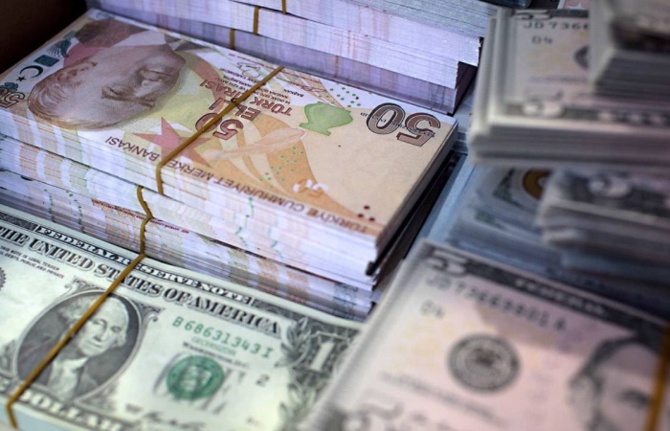Turkish Central Bank Confuses Markets with New Policies
Turkey’s Central Bank cut its key interest rate but raised the overnight borrowing rates at an unscheduled Monetary Policy Committee meeting Thursday, surprising markets and economists.
The decision appeared to contradict the ongoing policy to cool down the overheated economy.
The twin move aims to help Turkey cope with global economic strains and prevent its fast-growing economy from being dragged into recession, a statement by the bank said after the meeting. According to several economists, the statement indicates that the bank sees economic growth as a priority, not price stability.
The Monetary Policy Committee lowered its key policy rate from 6.25 percent to 5.75 percent, it said in a statement on its website.
“The committee decided to lower the policy rate in order to reduce the risk of domestic stagnation that might be caused by the growing problems of the global economy,” it said.
The Central Bank raised its overnight borrowing rates from 1.5 percent to 5.0 percent in order to “reduce the volatility” in short-term interest rates in a bid to narrow the interest rate corridor.
Foreign exchange auctions
Along with the shift in rates, the bank also announced it would restart selling foreign exchange. The bank said it would hold foreign exchange selling auctions “whenever it deemed necessary” starting Friday. The last time the Central Bank held a foreign exchange auction was April 2, 2009. Selling auctions were suspended as of April 3, 2009. The Central Bank also suspended its foreign exchange buying auctions as of July 25, 2011. It had bought $21.3 billion during the previous 19 months.
“For buying opportunities we think stabilization in the exchange rate is required and we think market players will test the Central Bank’s willingness to provide foreign exchange liquidity to the system,” said Özgür Altuğ of BGC Partners in a note to investors. “Therefore, the daily foreign exchange selling auction amount will be very important, in our view.”
The bank’s rate cut came right after interventions by Swiss and Japanese authorities in a bid to secure the values of their national currencies.
Europe keeps rate unchanged
The European Central Bank, or ECB, meanwhile held its key interest rate for the eurozone steady at 1.50 percent. ECB President Jean-Claude Trichet said Thursday that the bank’s governing council voted overwhelmingly on a decision to renew sovereign bond purchases. The council was not unanimous but “we were an overwhelming majority on the operation as regards this bond purchases,” Trichet said after markets reported the ECB had resumed its controversial program of sovereign debt purchases.
In a similar move, the British central bank also kept the key interest rate unchanged at a meeting Thursday.
Criticism by Moody’s
On Wednesday, credit ratings agency Moody’s warned Turkey about growing domestic and external imbalances that could undermine its positive rating outlook if left unaddressed.
The Turkish economy contracted 4.7 percent in 2009 but grew 8.9 percent last year, higher than the government had forecast.
Moody’s said a rapid inflow of funds made Turkey “susceptible to sudden shocks or shifts in investor sentiment” and the immediate challenge for the country was to strengthen its resilience to external shocks by restraining domestic demand.
A new era
Murat Salar, the general manager of Osmanlı Portföy, a local portfolio management firm, said the bank’s decision shows a new era has begun: “[The bank] says it is widening the economy in a period when it was speaking of tightening the policy. This indicates that they have serious data on a slowdown.”
The bank is moving into a “crisis mode,” Fatih Keresteci of HSBC said in a note, adding, “The bank will provide the liquidity that the markets need under any condition.”
A research note from Finansbank said the bank took the latest measures in order to ensure a more balanced distribution of liquidity within the banking system.
“This, of course, is rather controversial as most market participants and rating agencies are still more concerned about overheating,” the lender said. “We are more sympathetic than the market to the bank’s position; yet we acknowledge that the investor community that has been skeptical about the policy framework all along will now be even more concerned about the bank’s stance.”
“Overall, [the decision is] positive for banks and fixed income securities in the short run but negative for [the Turkish] Lira in the near term,” said Altuğ. “However, the bank’s action caused confusion among investors as the uncertainty level increased.”
The bank shocked the market, agreed Timothy Ash of Royal Bank of Scotland.
“The danger with this totally out-of-the-box move is that investors will seriously begin to question the credibility of the bank as an institution, given that foreign investors’ prime concern at present on Turkey is fears of overheating as reflected in the current account deficit,” said Ash in his official note. “Thinking aloud I just wonder if this move is a signal also that the bank seems confident that the government will ride to its rescue by delivering some fiscal austerity when it delivers revisions to its medium-term program in September.”
August 4, 2011
SOURCE: Hürriyet Daily News




